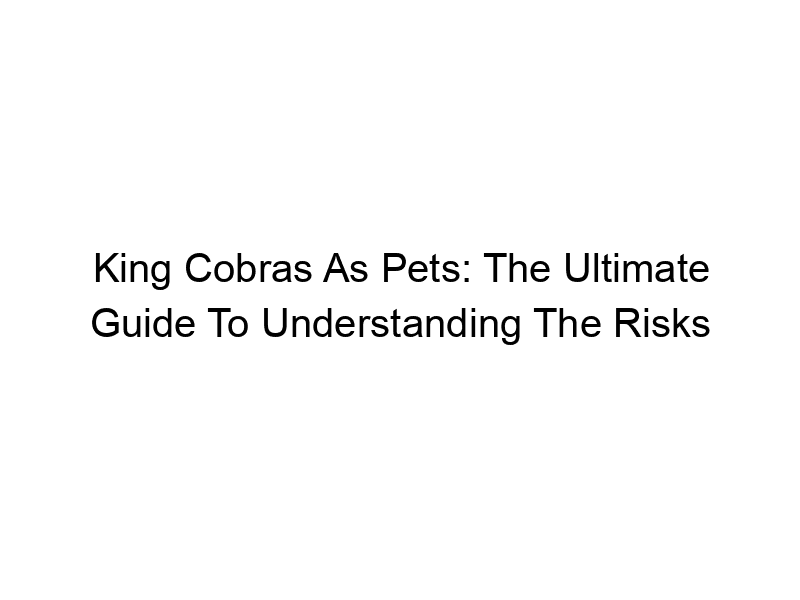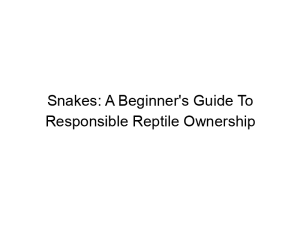Have you ever considered owning an exotic pet? The allure of a magnificent creature like a king cobra can be strong, but is it realistic? The Truth Behind the Mystery of the King Cobra as a Pet isn’t simply about exotic animal ownership; it’s a deep dive into the realities of handling one of the world’s most venomous snakes, the ethical considerations, and the sheer impossibility for most individuals. This article will explore everything you need to know before even considering this dangerous endeavor, covering legality, safety, care, and the profound ethical implications. You’ll learn about the immense responsibility, the high costs, and why this reptile is almost always unsuitable for a domestic environment.
The king cobra ( Ophiophagus hannah) is a highly venomous elapid snake, the longest venomous snake in
the world. Its size alone—reaching lengths of up to 18 feet—presents a significant challenge for even experienced reptile keepers. Their neurotoxic venom is incredibly potent, causing paralysis and potentially death if not treated immediately with antivenom.
Habitat and Natural Behavior
King cobras are native to forests and jungles across South and Southeast Asia. They are solitary creatures, primarily active during the day, and are known for their remarkable intelligence and hunting prowess. Unlike many other snakes, they don’t rely on ambush tactics; they actively hunt, often preying on other snakes, including venomous ones. This specialized diet is a crucial aspect to understanding their captive care needs.
The Legality of Keeping a King Cobra
International and National Regulations
Keeping king cobras is illegal in many countries, including the United States, due to their dangerous nature and the threat they pose to public safety. Strict regulations and permits are required in places where their ownership is even considered. These permits are rarely issued to private individuals due to the extensive requirements related to experience, facility safety, and emergency response protocols.
Consequences of Illegal Ownership
The penalties for illegally possessing a king cobra can be severe, including hefty fines, imprisonment, and the confiscation of the animal. The risk far outweighs any potential reward. The legal ramifications highlight the seriousness of attempting to keep this creature as a pet.
The Dangers of King Cobra Ownership
Venom Toxicity and Medical Emergencies
King cobra venom is incredibly potent, containing neurotoxins that cause paralysis, respiratory failure, and ultimately, death. Even with prompt medical attention, there is a significant risk of permanent disability or death. Antivenom is effective, but its availability varies depending on geographic location and access to healthcare.
Handling and Safety Protocols
The sheer size and strength of a king cobra, combined with its venomous nature, make safe handling virtually impossible for the average person. Even experienced reptile handlers face significant risks, requiring specialized equipment, training, and a high level of vigilance. One mistake could have fatal consequences.
Escape and Public Safety
A king cobra escape presents a considerable threat to public safety. Their ability to move quickly and their venomous bite pose a danger to anyone they encounter. The potential for widespread panic and harm necessitates careful consideration of the risks involved.
The Cost of King Cobra Care
Enclosure and Environmental Requirements
Providing a suitable enclosure for a king cobra is expensive. It requires a large, secure enclosure that mimics their natural habitat, including appropriate temperature and humidity control, climbing structures, and hiding places. The ongoing maintenance of such a habitat is a significant financial burden.
Specialized Equipment and Supplies
King cobra care involves specialized equipment, such as temperature and humidity controllers, specialized lighting, and secure handling tools. This equipment can be costly to purchase and maintain, adding to the overall expense of ownership.
Veterinary Care and Emergency Services
Veterinary care for a king cobra is expensive and specialized. Finding a veterinarian experienced in handling and treating venomous snakes is crucial. Emergency services for a bite or escape could incur significant expenses, both medically and in terms of potential damage or harm.
Ethical Considerations of King Cobra Ownership
Animal Welfare and Captivity
Keeping a king cobra in captivity raises serious ethical concerns about its welfare. These animals are wild creatures adapted to vast, complex environments. Confining them to a human-made enclosure, regardless of size, significantly impacts their natural behaviors and overall well-being.
The Impact on Conservation Efforts
The illegal capture and trade of king cobras threaten wild populations. The demand for these animals as pets contributes to habitat destruction and puts further strain on already vulnerable species.
Alternatives to King Cobra Ownership
Other Non-Venomous Snakes
Numerous non-venomous snake species make excellent pets for experienced reptile keepers. Corn snakes, ball pythons, and boa constrictors are popular choices, offering a fascinating experience without the inherent danger of venomous species.
Other Reptiles and Amphibians
Many other reptiles and amphibians, such as geckos, bearded dragons, and frogs, make suitable and less dangerous pets for those interested in exotic animals. Researching and selecting a species appropriate for your skill level and lifestyle is crucial.
Dispelling Common Myths
Myth 1: King Cobras Can Be Domesticated
While king cobras can become habituated to their keepers, they cannot be truly domesticated. Their inherent instincts and potential for aggression remain a constant threat.
Myth 2: With Proper Training, King Cobras Are Safe
The level of training required to manage a king cobra is beyond the reach of most individuals, and even with extensive training, the risk of a fatal bite remains high.
Frequently Asked Questions
What are the specific legal restrictions on owning a king cobra?
Legal restrictions vary widely depending on location. Some regions completely prohibit their possession, while others may require extensive permits and proof of expertise. Always check your local and national regulations before even considering it.
How much does it cost to care for a king cobra?
The costs are substantial, encompassing enclosure construction or purchase, specialized equipment, vet bills (which can be very high due to the potential for emergencies), and ongoing food expenses. Expect to invest thousands of dollars annually.
What should I do if I encounter a king cobra in the wild?
Maintain a safe distance, avoid sudden movements, and slowly back away. Seek help from wildlife authorities if the snake is in a populated area or presents a threat.
Final Thoughts
The allure of owning a king cobra might be tempting, but the reality is far more complex and dangerous. The risks associated with owning this magnificent but deadly creature significantly outweigh any perceived benefits. The high cost, the legal implications, the inherent safety hazards, and the ethical considerations all point towards one conclusion: keeping a king cobra as a pet is irresponsible and highly inadvisable for almost everyone. Instead, consider exploring the vast world of less dangerous reptiles and amphibians that can bring you similar joy and fascination without the potential for tragedy. Remember, responsible pet ownership prioritizes the well-being of the animal and the safety of those around it. Choose wisely and opt for a pet that aligns with your skills and resources.




